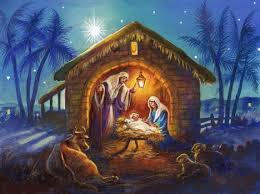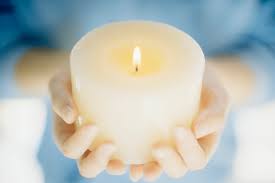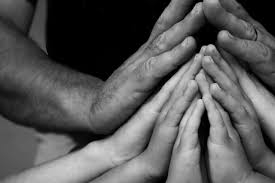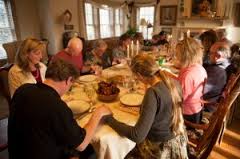For 12 days we celebrate the joyful news that Christ is born, that God is with us, that God became one of us. It is a rollicking season of unceasing merry-making and revelry from Christmas Day to the festival of Twelfth Night.
Or not. Our forebears in faith were not content with one-note seasons. They tended to trouble the waters. They insisted on truth.
On December 25, we celebrate the birth of the Messiah and gaze with wonder at this Child wrapped in swaddling clothes and lying in a manger.
December 26 is the feast of St. Stephen, the first Christian martyr.
December 27 is the feast of St. John the Evangelist, exile and prisoner for his testimony to Christ Jesus.
December 28 is the feast of the Holy Innocents, children slaughtered by Herod in his mad bloodthirsty zeal to protect his precarious throne.
Merry-making and revelry?
Yes. And no. Our forebears in faith were wiser than we. They were certainly better psychologists. They refused to take refuge in false binaries, in one-note simplifications. They understood, profoundly, that we live between the Now and the Not-Yet.
Yes, Christ has come. Already come. He is already laid in the manger, adored by shepherds and magi and His own mother. He is already nailed to the cross, wounded for our transgressions, bruised for our iniquities. He is already risen from the grave, gloriously triumphant over death and evil and sin and all that would separate us from Him.
That is true, even now.
But it is also true that death and evil and sin are fighting hard. They know they’re already defeated, and they’re trying to drag as many of us down with them as they can. They want to steal our hope, take our joy, snuff out our light.
They want to kill our faithful, exile our prophets, destroy our children. That is the world we live in, even as the Babe lies in the manger. Refugees fleeing for their lives (just as He and His family did), bombings, shootings, beheadings. And closer to home: cancer, estrangement, the missing face at the table never to be seen again in this life. Grief, loss, pain.
Those who followed in the footsteps of Jesus, in the footsteps of Stephen and John, knew suffering. Their world was one of violence and persecution, too. In their world, children died at the hands of greedy tyrants. In their world, military might made right. They knew fear and grief and pain and loss, possibly more deeply and certainly more immediately than we do, mediated as so much of our world is by a screen. They had no screens. They had a bloody God on a godforsaken cross, right before their eyes.
They knew suffering.
And they knew Jesus.
And they held the two together. They said, we will eat and drink and be merry and we will remember the martyrs, the exiles, the prisoners, the innocents. They said, we will lift up our voices in song, in praise, in shouts of glory, and we will grieve the deaths of those we love, the absence of those long lost. They said, grief is part of our praise, part of our celebration, because it is part of us and part of God. They said, we will feast and remember, remember the joy, remember the loss. But we will feast.
They knew, as we seem to have forgotten, that life is woven whole, that Christmas is a celebration of God made human, and the fullness of all that means. That Baby would grow to a Boy and then a Man, and He would know all that we know—joy and sorrow, love and loss, confusion and grief and horror. And He probably knew it more deeply than we can imagine. He was fully human.
They knew that death and destruction had been defeated when He submitted to death and destruction. They knew, the evidence of the world around them notwithstanding, that Heaven had broken through, that Life was on the loose, and that not all the forces of hell could prevail against Him.
They knew that was the world they inhabited, and they wanted us to know it, too. In their wisdom, they gave us the 12 days of Christmas, with the feasts of St. Stephen, St. John, and the Innocents right here at the start to remind us: this is part of the story, but it is not the end of the story.
The juxtaposition of these feast days with the season of Christmas gives us permission to live in the messy middle, the between times. We light our candles and sing our carols in the face of all that is ugly and evil. We join hands around the table and say grace and dig in to the feast and laugh and cry and remember those who are no longer with us and cling to the hope of that Heavenly Table of which ours is an icon, a foretaste, that Table where all our lost loved ones are even now feasting with the Risen King of Glory, where one day we will join them in the happiest reunion this world has ever known.
This Christmas feast, these Christmas carols, that pan of cookies for the neighbors, those cards for far-flung loved ones, your head flung back in laughter or bowed down in grief, your arms flung wide in embrace, your heart’s yearning and breaking—are acts of subversion, of defiant joy that refuses to be swallowed by your newsfeed, of rebellious hope that this is not the way things were meant to be, of stubborn faith that refuses to believe it will always be this way.
These are the outposts of the Kingdom here in the land between Already and Not-Yet.
Every time you link hands around the table, pray for peace, hope for a better future, light a candle, soothe a flaring temper, open your arms and your heart, weep over loss, rage over injustice—you proclaim the coming kingdom. And you usher it in. It starts with a mustard seed, a grain of yeast, a single lost son come Home.
A lowly babe in a manger. A small family fleeing from a king. A young man nailed to a cross. An empty tomb.
And the candle you light at your table tonight. And tomorrow night. And the night after that.
Come, Lord Jesus.




 RSS Feed
RSS Feed